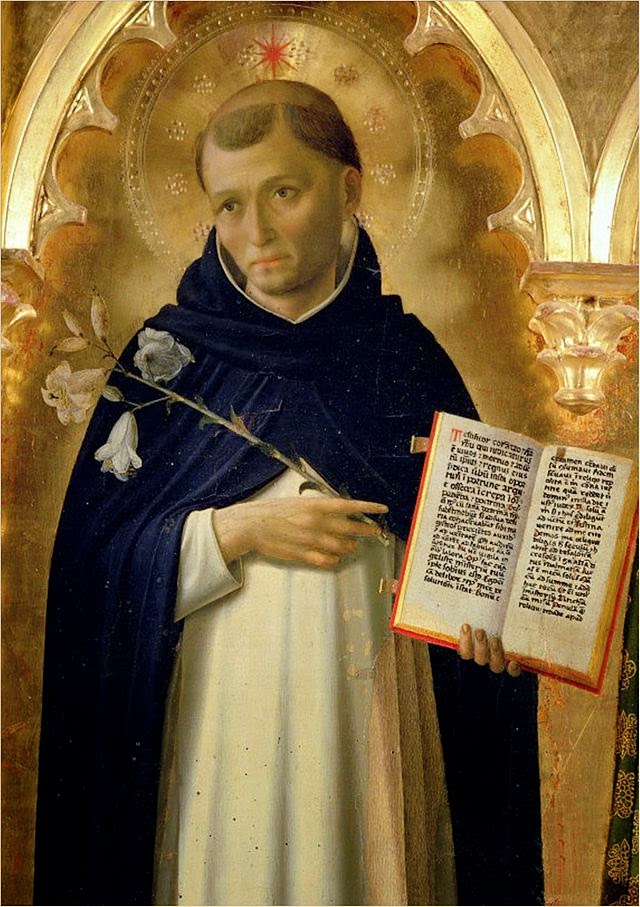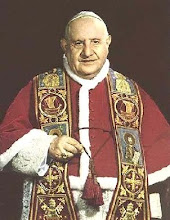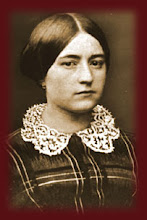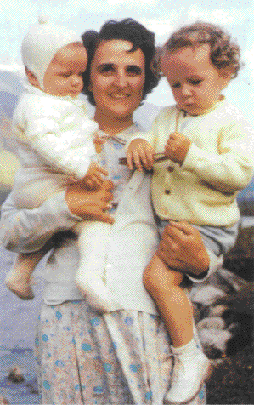Friday, February 28, 2014
Friday, February 14, 2014
Catholics with ASD Children and the Pro-Life Movement [UPDATED]
I had the unusual experience a few months ago of having a former mentor contact me to ask me to write a letter of recommendation for graduate school. M. was a remarkable soprano a few years my senior; as a young singer, I assiduously tried to pattern myself after her. But because of a combination of forces -- one of the most intractable of which was a difficult family situation -- her career was not what it might have been. She eventually became the mother of a large family, got an advanced degree, and began working in another field. The graduate program she was applying to, however, was in music, and, though I hadn't heard her in years and wondered what the appeal of a performance degree could possibly be at this stage in her life, I was happy to write on her behalf, and delivered a sincere assessment of her numerous fine qualities as an artist, colleague, and friend.
We had been out of touch for a few years and, while working on the letter, I gradually learned that since we'd last spoken, two of her children had been institutionalized for Heller's Syndrome -- also known as Child Disintegrative Disorder or CDD -- one at the age of six. Once considered a distinct diagnosis, CDD is now, like Asperger's at the other end of the dial, rolled under the rubric of Autism Spectrum Disorder in the DSM-5, the standard diagnostic manual for psychiatric disorders. If CDD is indeed a cognitive disorder that falls on the autism spectrum, it seems like a particularly brutal and horrible manifestation one: the child develops perfectly normally until the age of three or four, and then loses not only speech, but every other acquired skill as well. At this age, children have some awareness of what is going on, and the affected ones are reported to have episodes of extreme terror -- perhaps because they are losing the ability to speak, to do, to comprehend -- before they shut down completely.
I don't know how one survives such a thing as a parent.
But it's not as if one can stop getting up in the morning.
I started thinking about what it's like, as a practicing Catholic (which M. is as well), to have a child with autism. My own son with autism is only mildly affected, especially relative to M.'s two CDD children, and living with him, in spite of some painful difficulties presented by his behavior, also brings its own kind of fulfillment and rewards. But I haven't experienced any support -- neither understanding smiles or kind words, nor extensions of friendship -- from my faith community. I've found it extremely hard to make friends with mothers of typical children, including those I meet at church, because my ASD son is so obviously different, and his behavior can be so disruptive, that people with the usual sort of children either withdraw, or simply don't extend themselves. (I've also received this response from progressive types, interestingly; it generally comes about after my son has gone along passing for normal for a time, and then suddenly does something egregious.)
While I've never seen mothers of children with autism embraced in pro-life Catholic (or any other) circles, mothers of children with Down Syndrome are very much celebrated in our community. Perhaps this lionization of DS mothers is based on the fact that, since prenatal testing can reveal the condition, and the law permits a choice of responses to it, in many cases the parents of DS children have consciously chosen life for these children, something that many in the wider culture do not do. So, if there were some kind of prenatal test that revealed autism in utero, and if mothers in these circumstances also "chose life" (which I would wager far fewer in the larger culture would do for autistic unborn children than they do even for DS), would these mothers find more support from Catholic mothers of typical children? I don't think so.
Children with Down Syndrome are generalized to be happy and loving, and even to have unique propensities for holiness; they are sentimentalized as "special" gifts from God for "special" parents. Children with autism are not. Children with Down Syndrome are welcomed, even celebrated, by people of faith; who can forget the near-hagiography surrounding Trig, the DS infant son of Sarah Palin, during the presidential campaign of 2008? Children with autism are not; in fact, when they are murdered by their parents, a chorus of voices generally arises to exonerate their killers. Children with Down Syndrome are viewed as sweet-natured, possessed of a unique sort of hidden wisdom, Holy Fools. Children with autism are . . . not. Even a beloved friend of mine, a faithful Catholic whom I respect and admire, told me that she would be happy to babysit for Jude, but not for my older son. (In her defense, she apologized immediately afterward, but I brooded about it for weeks.)
Even the panic over vaccines, and the increasing rates of vaccine refusal on the misguided ground that they cause autism -- and the vaccine-deniers cut through a cross-section of conservative and liberal -- underlines the point: no one wants a child with autism. Even in what we like to think of as the Catholic subculture -- the counterculture! -- the undergirding of our dominant American materialist-Calvinist culture bleeds through, and I suspect that parents of autistic children, and the children themselves, are seen to a certain degree as cursed by God, with an undercurrent of "who sinned, this man or his parents, that he should be born blind?"
If anyone looks at me, they have plenty of reason to confirm such a belief. I'm an egregious sinner. And my husband was in his forties when our autistic son was conceived, and there's a strong correlation between autism and paternal age. So people in our midst may breathe a sigh of relief if they have avoided our mistakes, or may congratulate themselves for their superior wisdom and virtue. They may even refuse vaccines. Perhaps they will thus be able to avoid both the very real difficulties and the very real loneliness of having children with autism. Or perhaps not. Who knows? But the persistent, underlying narrative, both in the larger world and in the subculture of faithful Catholics, is that autistic lives are less valuable, and far less desired, even than other disabled lives, and that if you get too close, some of it might rub off on you.
The Talmud suggests a prayer to be recited upon seeing a person who is disabled; perhaps it can be applied to people with autism as well, although they often do not appear different:
One who sees… an albino, or a giant, or a dwarf, or a person with dropsy, says ‘Blessed is He who made his creations different from one another.’ One who sees a person with missing limbs, or a blind person, or one with a flattened head, or a lame person, or one who suffers from boils or a person with a whitening skin complaint says, ‘Blessed is the true Judge.’ (Talmud Bavli Berachot 58b)
I do not expect to be celebrated by my co-religionists or anyone else for having an autistic child, but I would like not to be shunned. And I think that a real challenge at the heart of the pro-life movement is to formulate a loving response to the lives of those with disabilities, including the disabilities that are not immediately apparent, are not cuddly and inviting, and may not make you feel like a Good Person for embracing. For God is present in even the most disastrous of lives.
We had been out of touch for a few years and, while working on the letter, I gradually learned that since we'd last spoken, two of her children had been institutionalized for Heller's Syndrome -- also known as Child Disintegrative Disorder or CDD -- one at the age of six. Once considered a distinct diagnosis, CDD is now, like Asperger's at the other end of the dial, rolled under the rubric of Autism Spectrum Disorder in the DSM-5, the standard diagnostic manual for psychiatric disorders. If CDD is indeed a cognitive disorder that falls on the autism spectrum, it seems like a particularly brutal and horrible manifestation one: the child develops perfectly normally until the age of three or four, and then loses not only speech, but every other acquired skill as well. At this age, children have some awareness of what is going on, and the affected ones are reported to have episodes of extreme terror -- perhaps because they are losing the ability to speak, to do, to comprehend -- before they shut down completely.
I don't know how one survives such a thing as a parent.
But it's not as if one can stop getting up in the morning.
I started thinking about what it's like, as a practicing Catholic (which M. is as well), to have a child with autism. My own son with autism is only mildly affected, especially relative to M.'s two CDD children, and living with him, in spite of some painful difficulties presented by his behavior, also brings its own kind of fulfillment and rewards. But I haven't experienced any support -- neither understanding smiles or kind words, nor extensions of friendship -- from my faith community. I've found it extremely hard to make friends with mothers of typical children, including those I meet at church, because my ASD son is so obviously different, and his behavior can be so disruptive, that people with the usual sort of children either withdraw, or simply don't extend themselves. (I've also received this response from progressive types, interestingly; it generally comes about after my son has gone along passing for normal for a time, and then suddenly does something egregious.)
While I've never seen mothers of children with autism embraced in pro-life Catholic (or any other) circles, mothers of children with Down Syndrome are very much celebrated in our community. Perhaps this lionization of DS mothers is based on the fact that, since prenatal testing can reveal the condition, and the law permits a choice of responses to it, in many cases the parents of DS children have consciously chosen life for these children, something that many in the wider culture do not do. So, if there were some kind of prenatal test that revealed autism in utero, and if mothers in these circumstances also "chose life" (which I would wager far fewer in the larger culture would do for autistic unborn children than they do even for DS), would these mothers find more support from Catholic mothers of typical children? I don't think so.
Children with Down Syndrome are generalized to be happy and loving, and even to have unique propensities for holiness; they are sentimentalized as "special" gifts from God for "special" parents. Children with autism are not. Children with Down Syndrome are welcomed, even celebrated, by people of faith; who can forget the near-hagiography surrounding Trig, the DS infant son of Sarah Palin, during the presidential campaign of 2008? Children with autism are not; in fact, when they are murdered by their parents, a chorus of voices generally arises to exonerate their killers. Children with Down Syndrome are viewed as sweet-natured, possessed of a unique sort of hidden wisdom, Holy Fools. Children with autism are . . . not. Even a beloved friend of mine, a faithful Catholic whom I respect and admire, told me that she would be happy to babysit for Jude, but not for my older son. (In her defense, she apologized immediately afterward, but I brooded about it for weeks.)
Even the panic over vaccines, and the increasing rates of vaccine refusal on the misguided ground that they cause autism -- and the vaccine-deniers cut through a cross-section of conservative and liberal -- underlines the point: no one wants a child with autism. Even in what we like to think of as the Catholic subculture -- the counterculture! -- the undergirding of our dominant American materialist-Calvinist culture bleeds through, and I suspect that parents of autistic children, and the children themselves, are seen to a certain degree as cursed by God, with an undercurrent of "who sinned, this man or his parents, that he should be born blind?"
If anyone looks at me, they have plenty of reason to confirm such a belief. I'm an egregious sinner. And my husband was in his forties when our autistic son was conceived, and there's a strong correlation between autism and paternal age. So people in our midst may breathe a sigh of relief if they have avoided our mistakes, or may congratulate themselves for their superior wisdom and virtue. They may even refuse vaccines. Perhaps they will thus be able to avoid both the very real difficulties and the very real loneliness of having children with autism. Or perhaps not. Who knows? But the persistent, underlying narrative, both in the larger world and in the subculture of faithful Catholics, is that autistic lives are less valuable, and far less desired, even than other disabled lives, and that if you get too close, some of it might rub off on you.
The Talmud suggests a prayer to be recited upon seeing a person who is disabled; perhaps it can be applied to people with autism as well, although they often do not appear different:
One who sees… an albino, or a giant, or a dwarf, or a person with dropsy, says ‘Blessed is He who made his creations different from one another.’ One who sees a person with missing limbs, or a blind person, or one with a flattened head, or a lame person, or one who suffers from boils or a person with a whitening skin complaint says, ‘Blessed is the true Judge.’ (Talmud Bavli Berachot 58b)
I do not expect to be celebrated by my co-religionists or anyone else for having an autistic child, but I would like not to be shunned. And I think that a real challenge at the heart of the pro-life movement is to formulate a loving response to the lives of those with disabilities, including the disabilities that are not immediately apparent, are not cuddly and inviting, and may not make you feel like a Good Person for embracing. For God is present in even the most disastrous of lives.
Sunday, February 9, 2014
The South Wind
In spite of the fact that the cold of this winter seems to have etched itself into my bones, now that I can drive, I go all around in my own solipsistic, climate-controlled little realm, creating my own atmosphere with recorded music. Nonetheless, I have to be careful what I play, because there's a lot of music across genres that can make me cry, even bawl, which makes for unsafe driving. I had to pull over last week while listening to Sam Cooke singing "A Change is Gonna Come."
But these past few days, I've been playing the same song over and over again as I drive: the eighteenth-century Irish song "The South Wind," sung by Jean Redpath, for which, sadly, there is no Youtube video, though this is a very nice instrumental rendition.
The Jean Redpath version is on her album A Fine Song for Singing, and is accompanied by guitar, cello, and violin in a chamber-music-like setting. And it is transcendentally beautiful. The four parts evoke a conversation by turns charming, witty, and haunting, trading off the melody between them, with the violin in particular articulating a wide and subtle range of emotions. In the heart of a hard winter, hearing this song reconciles me to the possibility of a coming lightness, a kind of hope.
But I also hear the song, in these last few days, as a kind of accidental-but-apt encomium for the husband of a friend of mine who died suddenly last week. He was a beloved public school teacher, many of whose former students have said that he changed -- even saved -- their lives. His funeral was at an orthodox Jewish synagogue, and during it I found myself longing for the kind of warmth and community I've often noted among observant Jews, which seems so absent from Catholic life as I've known it (they have joy, mysticism, fellow-feeing, and an ethos of life in its fullness; and we have, it often seems, sourness, primness, division, and an ethos of life in its meanness. Why should this be? I've heard that it's the result of the Jansenism imported by the Irish clergy, and also that it's a Northern thing. But it's enough to make me sometimes feel like the Inuit seal-hunter who supposedly asked the missionary priest if he would go to hell if he didn't know about the truth of Christ. No, said the priest; the risk of hell was only for those who knew the truth, but chose to reject it. To which the hunter replied, Then why did you tell me?)
Tonight I'm going to sit shiva with his family, including the adolescent daughter who has been an occasional voice student of mine. I've never been to a shiva before, but my understanding is that one goes to keep the mourners company, to be with them in their grief, to let them know that they are not alone (I wish we had a tradition like this!). I will bring them a platter of cookies, and also a copy of the Jean Redpath CD. The words of the song go, in part:
South wind of the gentle rain,
You banish winter weather,
Bring salmon to the pool again,
The bees among the heather.
If northward now you mean to blow
As you rustle soft above me,
Godspeed be with you as you go,
And a kiss for those that love me.
From south I come with velvet breeze;
My word all nature blesses;
I melt the snow and strew the leaves
With flowers and warm caresses.
I'll help you to dispel your woes,
With joy I'll take your greeting
And bear it to your loved Mayo
Upon my wings so fleeting.
I will pray that God will send solace to this family, and that, like the south wind, He will, some day in the future, coax the grief of this long winter slowly from their hearts.
But these past few days, I've been playing the same song over and over again as I drive: the eighteenth-century Irish song "The South Wind," sung by Jean Redpath, for which, sadly, there is no Youtube video, though this is a very nice instrumental rendition.
The Jean Redpath version is on her album A Fine Song for Singing, and is accompanied by guitar, cello, and violin in a chamber-music-like setting. And it is transcendentally beautiful. The four parts evoke a conversation by turns charming, witty, and haunting, trading off the melody between them, with the violin in particular articulating a wide and subtle range of emotions. In the heart of a hard winter, hearing this song reconciles me to the possibility of a coming lightness, a kind of hope.
But I also hear the song, in these last few days, as a kind of accidental-but-apt encomium for the husband of a friend of mine who died suddenly last week. He was a beloved public school teacher, many of whose former students have said that he changed -- even saved -- their lives. His funeral was at an orthodox Jewish synagogue, and during it I found myself longing for the kind of warmth and community I've often noted among observant Jews, which seems so absent from Catholic life as I've known it (they have joy, mysticism, fellow-feeing, and an ethos of life in its fullness; and we have, it often seems, sourness, primness, division, and an ethos of life in its meanness. Why should this be? I've heard that it's the result of the Jansenism imported by the Irish clergy, and also that it's a Northern thing. But it's enough to make me sometimes feel like the Inuit seal-hunter who supposedly asked the missionary priest if he would go to hell if he didn't know about the truth of Christ. No, said the priest; the risk of hell was only for those who knew the truth, but chose to reject it. To which the hunter replied, Then why did you tell me?)
Tonight I'm going to sit shiva with his family, including the adolescent daughter who has been an occasional voice student of mine. I've never been to a shiva before, but my understanding is that one goes to keep the mourners company, to be with them in their grief, to let them know that they are not alone (I wish we had a tradition like this!). I will bring them a platter of cookies, and also a copy of the Jean Redpath CD. The words of the song go, in part:
South wind of the gentle rain,
You banish winter weather,
Bring salmon to the pool again,
The bees among the heather.
If northward now you mean to blow
As you rustle soft above me,
Godspeed be with you as you go,
And a kiss for those that love me.
From south I come with velvet breeze;
My word all nature blesses;
I melt the snow and strew the leaves
With flowers and warm caresses.
I'll help you to dispel your woes,
With joy I'll take your greeting
And bear it to your loved Mayo
Upon my wings so fleeting.
I will pray that God will send solace to this family, and that, like the south wind, He will, some day in the future, coax the grief of this long winter slowly from their hearts.
Labels:
death,
driving,
folk music,
Jean Redpath,
judaism,
Sam Cooke,
suffering world,
winter
Subscribe to:
Posts (Atom)










